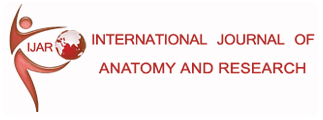IJAR.2016.464
Type of Article: Original Research
Volume 5; Issue 1 (January 2017)
Page No.: 3329-3332
DOI: https://dx.doi.org/10.16965/ijar.2016.464
INCIDENCE OF EPIPTERIC BONES: AN ANATOMICAL STUDY WITH CLINICAL IMPLICATIONS
Tallapaneni Sreekanth*
MD, Associate Professor, Department of Anatomy, Shadan Institute of Medical Sciences, Teaching Hospital & Research Center, Peerancheeruvu, Near Arramaisamma Temple, Hyderabad, Telangana, India.
Address for Correspondence: Dr. Tallapaneni Sreekanth, Associate Professor, Department of Anatomy, Shadan Institute of Medical Sciences, Teaching Hospital & Research Center, Peerancheeruvu, Near Arramaisamma Temple, Hyderabad, Telangana, India. Mobile No: 70934 49309, 91006 83056. E-Mail: anatomysreekanth18@yahoo.com
ABSTRACT
Introduction: Epipteric bones are small irregular ossicles that occur near the former antero lateral fontanelle of the cranium having no regular relations to their normal ossific centres.
Materials and Methods: The present study was conducted on 120 dry adult human skulls collected from both the Anatomy and Forensic Department also from the students of Shadan Institute of Medical Sciences, Teaching Hospital and Research Centre. They were examined meticulously for the presence of Epipteric bones and photographs were taken.
Results: In the present study the unilateral occurrence of epipteric bones was seen in 6 (5%) skulls out of 120 skulls. 4 (3.33%) skulls showed in left pterion and 2 (1.67%)skulls showed in right pterion. Only in one case 2 sutural bones were present at the right pterion. Remaining skulls showed single relatively larger epipteric bones.
Conclusion: The anatomical knowledge of the epipteric bones is essential for anthropologists, radiologists reporting skiagrams of skulls in head injuries, neurosurgeons while performing burr holes during excision of intra cranial tumours and neuroanatomists.
Key words: pterion, epipteric bones.
REFERENCES
- Broca, P. Instructions craniologiques et craniometriques. Mem. Soc. Anthrop. Paris, 1875;2:1-203.
- Murphy, T. The pterion in the Australian aborigine. Am. J. Phys. Anthropol., 1956;14(2);225-44.
- Hess L. Ossicula wormiana. Human biology. 1946;18:61-80.
- Pal G P. Variations of the interparietal bone in J. Anat. 1987;152:205-208.
- Bergman RA, Afifi AK, Miyauchi R. Skeletal systems: Cranium. In: Compendium of human anatomical variations. Baltimore, Urban and Schwarzenberg. 1988;197-205.
- Saxena SK, Jain SP, Chowdhary DS,A comparative study of pterion formation and its variations in the skulls of Nigerians and Indians. Anthropol. Anz. 1988;46:75-82.
- Majjula Patil, Santosh Sheelavant. Sexual Dimorphism among the Wormian Bones In Adult Human Skulls. Journal Indian Acad Forensic Med. 2012;34(2):124-127.
- Mwachaka, PM, Hassanali, J andOdula P. Sutural morphology of the pterion and asterion among adult Kenyans. J. Morphol. Sci. 2009;26:4-7.
- Uday kumar, Ratna Prabha J. Wormian bones: Study on dry human skulls in North Karnataka Region. Int. J. Anat. Res. 2016;4(1):1854-58.
- Raja Sekhar Katikireddi, Siva Nageswara Rao Sundara Setty. Incidence of sutural bones at pterion in south Indian dried skulls. Int. J. Anat. Res. 2016;4(1):2099-01.
- Hussain Saheb S. Haseena S, Prasanna L C. Unusual Wormian bones at Pterion- Three case reports. J. Biomed. Sci and Res. 2010;2(2):116-118.
- Raju Sugavasi, Sujatha. M, Indira Devi. B, Sirisha. B. Unusual sutural bone at pterion. A case report. International Journal of current research and review. 2012;04(07):101-103.
- Pryles DV, Khan AJ. Wormian bones. A Marker of CNS Abormality. Am.J.Dis Child.1979;133:380-382.
- Satheesha Nayak B, Soumya KV. Unusual sutural bones at Pterion. International Journal of Anatomical Variations. 2008;1:19-20.
- Ersoy M, Evilyaoglu C, Bozkurt MC, Konuskan B, Tekdemir I, Keskil IS. Epipteric Bones in the Pterion may be a surgical pitfall. Minim. Invasive Neurosurg. 2003;46:363-365.








